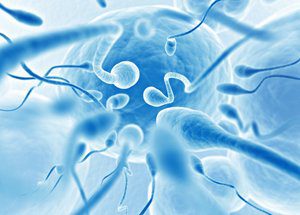Many women pay close attention to their menstrual cycles when figuring out the best days to get pregnant, but maybe it's time to focus more on what's going on with your man. If you're trying to conceive and you haven't yet found success, the problem might lie in your man's sperm. It could be that his sperm haven't been at their healthiest lately. Recent research has found that a man's sperm don't swim as fast, aren't as plentiful and have more abnormalities during the summer and fall. It may be time to get busy with your babymaking before the spring temperatures start to climb!
Sperm are healthier in winter and spring
An Israeli study published in the American Journal of Obstetrics & Gynecology analyzed sperm samples from more than 6,000 men treated for infertility. They found that sperm counts were higher and sperm swam faster and had fewer abnormalities during the winter, with a steady decline in quality from spring onward.
For the study, lead researcher Eliahu Levitas from Ben-Gurion University of the Negev in Beer-Sheva and his colleagues collected sperm samples from men at their fertility clinic between January 2006 and July 2009. Of the 6,455 samples analyzed, 4,960 had normal sperm production and 1,495 had abnormal production, such as low sperm count.
According to the World Health Organization, 16 million sperm per milliliter of semen or more qualifies as a normal sperm count. The men with normal sperm production produced about 70 million sperm per milliliter of semen during the winter. About 5 percent of those sperm had fast swimming speeds, which can help a couple that's trying to get pregnant. During the spring, the men produced 68 million sperm per milliliter, and only about 3 percent were fast swimmers.
The men with abnormal sperm production didn't see these results. Their sperm were slightly faster during the fall. During the spring, they made the most amount of normal-shaped sperm.
What does this mean?
"Based on our results the (normal) semen will perform better in winter, whereas infertility cases related to low sperm counts should be encouraged to choose spring and fall," the study's researchers wrote.
Basically, if you've been to a fertility clinic and your man's sperm is healthy, or if you didn't have problems conceiving your first child, the best days to get pregnant might be during the winter. If your man has been shown to have a lower sperm count, try having more sex in the spring and fall to encourage conception. Of course, you should also encourage healthy behavior from your guy, like cutting back on the amount of alcohol he drinks, quitting smoking and maintaining a healthy weight, all of which can help boost his sperm health.
